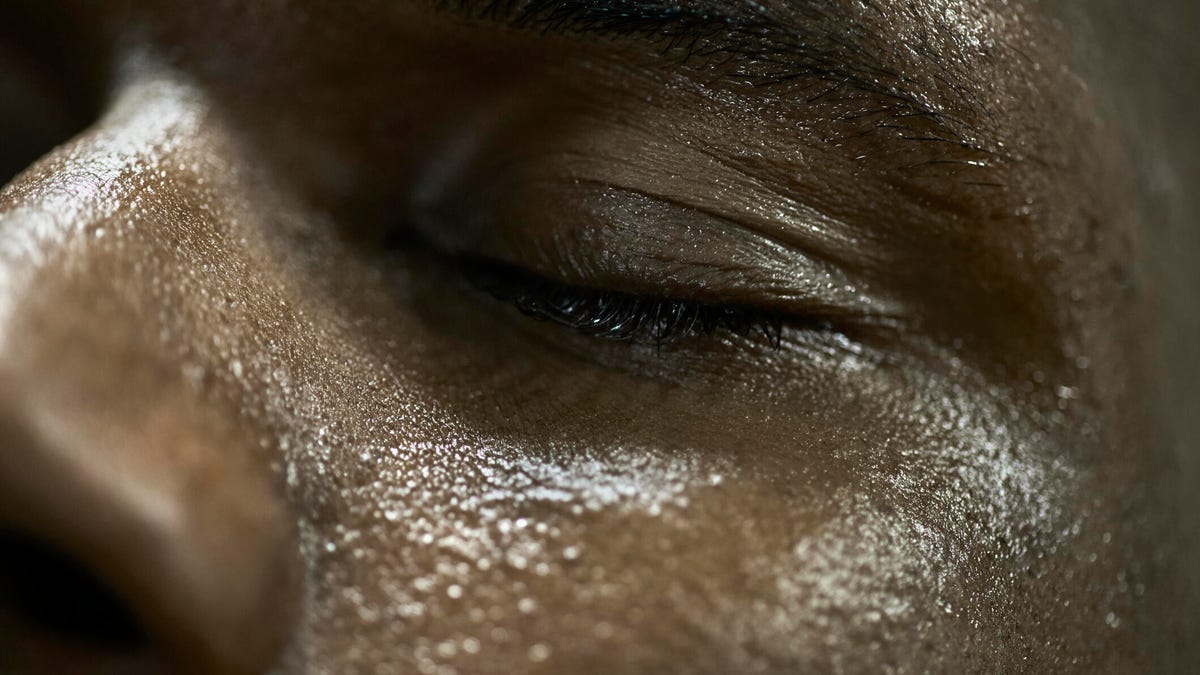What happens to your body when you sweat, and other sweat facts
We all do it, but exactly what does sweating do for your body, and why does it smell?

Everyone knows that sweating is the body's way of cooling you down -- when sweat reaches the surface of your skin, it evaporates, which has a cooling effect. But not many people understand exactly what happens inside the body to cause those droplets to appear on your skin -- and not many people know that sweat itself doesn't smell, either. Learn all about your body's cooling system with these sweaty fun facts.
What happens when you break a sweat?
You have millions of sweat glands across your body. There are three types of sweat glands: eccrine, apocrine and apoeccrine. Eccrine sweat glands exist on virtually every part of your body and they secrete sweat through ducts that open directly onto your skin's surface. Apocrine glands are concentrated more in areas with lots of hair follicles, including your armpits, groin and scalp. Apocrine glands secrete sweat through hair follicles to the skin. Apoeccrine glands share properties of both eccrine and apocrine glands, as the name implies.
When your body temperature rises, your sympathetic nervous system triggers eccrine glands to secrete sweat. Apocrine glands, despite being located in the sweatiest areas associated with exercise, are actually triggered in different scenarios (more on that below). Apoeccrine glands may secrete some sweat when you get hot, but not as much as eccrine glands.
Why some people sweat when they're nervous
Sometimes, sweat appears in the most unfortunate of scenarios, like when you're onstage giving a presentation in front of 100 people. Or when you're taking someone out on a first date, or you're asking for a raise at work.
It's common to sweat in response to emotions like nervousness, embarrassment or fear -- but why?
Emotional sweating is a product of your body's fight-or-flight system that's activated when you're in a nerve-wracking scenario. It's the same reason your heart starts to beat rapidly, your breathing rate increases and you get a strange feeling in your gut.
Basically, nervous sweating is your body's way of trying to survive the situation. It doesn't know the difference between leaning in for a first kiss and hiding from a bear.
Why some people sweat while eating
Spicy food can make you sweat.
Spicy foods cause some people to sweat because the spiciness tricks your brain into thinking your body is overheating. This is common enough to have a name -- it's called gustatory sweating.
Eating a heavy meal can also trigger sweating, likely due to the fact that metabolizing food can increase your body temperature. This is where the weird and slightly gross term "meat sweats" comes from.
You may also sweat while drinking coffee, tea, hot chocolate or other warm beverages. In this case, your body notices an increase in temperatures and starts the cooling process to counteract the warm drink.
Sweat efficiency
Here's a cool fact: People who sweat more often can actually become more efficient at sweating. Yes, you can actually get better at sweating.
Studies show that people who are acclimated to sweating, such as those who exercise often and those who live in warm climates, begin to sweat sooner and sweat more overall than nonacclimated people.
In other words, people who sweat on the regular can develop quicker sweat responses than people who don't sweat often. The body gets better at reacting to the increase in body temperature and therefore can more efficiently cool down.
What is sweat made of?
Sweat contains mostly water, but it also contains electrolytes and waste products. Your body loses potassium, sodium and chloride through sweat, and it's important to replenish those electrolytes with food and beverages after sweating. Sweat is a removal route for urea, a byproduct of the breakdown of proteins, and ammonia.
Why does sweat smell?
Sweat starts to smell when bacteria on your skin ferment it.
Sweat actually doesn't smell. Your damp workout clothes in the hamper may beg to differ, but it's true. Sweat itself is virtually odorless. When sweat reaches the surface of the skin, however, it mixes with bacteria that break sweat down into acids that smell. So really, it's a chemical reaction producing your B.O., not your sweat alone.
Does sweat detox your body?
Though sweat does contain waste, including urea and ammonia, the amounts are so trace that it can hardly be considered a detox. Your body has plenty of other detoxification systems, so no need to worry. Your digestive system, lymphatic system and urinary system all remove waste from your body in different ways.
Next time someone asks you to go "sweat out your toxins" in hot yoga class, just say no (to the toxin part -- yoga is fine).

